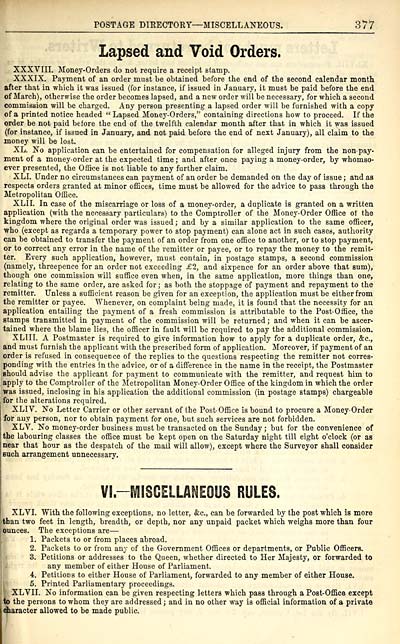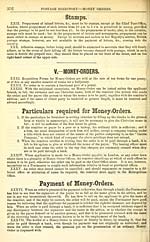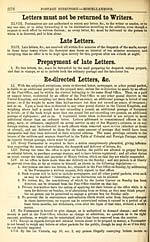Download files
Complete book:
Individual page:
Thumbnail gallery: Grid view | List view

POSTAGE DIRECTORY — MISCELLANEOUS. 377
Lapsed and Void Orders.
XXXVIII. Money-Orders do not require a receipt stamp.
XXXIX. Payment of an order must be obtained before the end of the second calendar month
after that in which it was issued (for instance, if issued in January, it must be paid before the end
of March), otherwise the order becomes lapsed, and a new order will be necessary, for which a second
commission will be charged. Any person presenting a lapsed order will be furnished with a copy
of a printed notice headed "Lapsed Money-Orders," containing directions how to proceed. If the
order be not paid before the end of the twelfth calendar month after that in which it was issued
(for instance, if issued in January, and not paid before the end of next January), all claim to the
money will be lost.
XL. No application can be entertained for compensation for alleged injury from the non pay-
ment of a money-order at the expected time ; and after once paying a money-order, by whomso-
ever presented, the Office is not liable to any further claim.
XLI. Under no circumstances can payment of an order be demanded on the day of issue ; and as
respects orders granted at minor offices, time must be allowed for the advice to pass through the
Metropolitan Office.
XLIL In case of the miscarriage or loss of a money-order, a duplicate is granted on a written
application (with the necessary particulars) to the Comptroller of the Money-Order Office ot the
kingdom where the original order was issued ; and by a similar application to the same officer,
who (except as regards a temporary power to stop payment) can alone act in such cases, authority
can be obtained to transfer the payment of an order from one office to another, or to stop payment,
or to correct any error in the name of the remitter or payee, or to repay the money to the remit-
ter. Every such application, however, must contain, in postage stamps, a second commission
(namely, threepence for an order not exceeding £2, and sixpence for an order above that sum),
though one commission will suffice even when, in the same application, more things than one,
relating to the same order, are asked for; as both the stoppage of payment and repayment to the
remitter. Unless a sufficient reason be given for an exception, the application must be either from
the remitter or payee. Whenever, on complaint being made, it is found that the necessity for an
application entailing the payment of a fresh commission is attributable to the Post-Office, the
stamps transmitted in payment of the commission will be returned ; and when it can be ascer-
tained where the blame lies, the officer in fault will be required to pay the additional commission.
XLIII. A Postmaster is required to give information how to apply for a duplicate order, &c.,
and must furnish the applicant with the prescribed form of application. Moreover, if payment of an
order is refused in consequence of the replies to the questions respecting the remitter not corres-
ponding with the entries in the advice, or of a difference in the name in the receipt, the Postmaster
should advise the applicant for payment to communicate with the remitter, and request him to
apply to the Comptroller of the iletropolitan Money-Order Office of the kingdom in which the order
was issued, inclosing in his application the additional commission (in postage stamps) chargeable
for the alterations required.
XLIV. No Letter Carrier or other servant of the Post-Office is bound to procure a Money- Order
for any person, nor to obtain payment for one, but such services are not forbidden.
XLV. No money-order business must be transacted on the Sunday; but for the convenience of
the labouring classes the office must be kept open on the Saturday night till eight o'clock (or as
near that hour as the despatch of the mail will allow), except where the Surveyor shall consider
such arrangement unnecessary.
VI -MISCELLANEOUS RULES.
XLVI. With the following exceptions, no letter, &c., can be forwarded by the post which is more
than two feet in length, breadth, or depth, nor any unpaid packet which weighs more than four
ounces. The exceptions are —
1. Packets to or from places abroad.
2. Packets to or from any of the Government Offices or departments, or Public Officers.
3. Petitions or addresses to the Queen, whether directed to Her Majesty, or forwarded to
any member of either House of Parliament.
4. Petitions to either House of Parliament, forwarded to any member of either House.
5. Printed Parliamentary proceedings.
XLVII. No information can be given respecting letters which pass through a Post-Office except
to the persons to whom they are addressed ; and in no other way is official information of a private
diaracter allowed to be made public.
Lapsed and Void Orders.
XXXVIII. Money-Orders do not require a receipt stamp.
XXXIX. Payment of an order must be obtained before the end of the second calendar month
after that in which it was issued (for instance, if issued in January, it must be paid before the end
of March), otherwise the order becomes lapsed, and a new order will be necessary, for which a second
commission will be charged. Any person presenting a lapsed order will be furnished with a copy
of a printed notice headed "Lapsed Money-Orders," containing directions how to proceed. If the
order be not paid before the end of the twelfth calendar month after that in which it was issued
(for instance, if issued in January, and not paid before the end of next January), all claim to the
money will be lost.
XL. No application can be entertained for compensation for alleged injury from the non pay-
ment of a money-order at the expected time ; and after once paying a money-order, by whomso-
ever presented, the Office is not liable to any further claim.
XLI. Under no circumstances can payment of an order be demanded on the day of issue ; and as
respects orders granted at minor offices, time must be allowed for the advice to pass through the
Metropolitan Office.
XLIL In case of the miscarriage or loss of a money-order, a duplicate is granted on a written
application (with the necessary particulars) to the Comptroller of the Money-Order Office ot the
kingdom where the original order was issued ; and by a similar application to the same officer,
who (except as regards a temporary power to stop payment) can alone act in such cases, authority
can be obtained to transfer the payment of an order from one office to another, or to stop payment,
or to correct any error in the name of the remitter or payee, or to repay the money to the remit-
ter. Every such application, however, must contain, in postage stamps, a second commission
(namely, threepence for an order not exceeding £2, and sixpence for an order above that sum),
though one commission will suffice even when, in the same application, more things than one,
relating to the same order, are asked for; as both the stoppage of payment and repayment to the
remitter. Unless a sufficient reason be given for an exception, the application must be either from
the remitter or payee. Whenever, on complaint being made, it is found that the necessity for an
application entailing the payment of a fresh commission is attributable to the Post-Office, the
stamps transmitted in payment of the commission will be returned ; and when it can be ascer-
tained where the blame lies, the officer in fault will be required to pay the additional commission.
XLIII. A Postmaster is required to give information how to apply for a duplicate order, &c.,
and must furnish the applicant with the prescribed form of application. Moreover, if payment of an
order is refused in consequence of the replies to the questions respecting the remitter not corres-
ponding with the entries in the advice, or of a difference in the name in the receipt, the Postmaster
should advise the applicant for payment to communicate with the remitter, and request him to
apply to the Comptroller of the iletropolitan Money-Order Office of the kingdom in which the order
was issued, inclosing in his application the additional commission (in postage stamps) chargeable
for the alterations required.
XLIV. No Letter Carrier or other servant of the Post-Office is bound to procure a Money- Order
for any person, nor to obtain payment for one, but such services are not forbidden.
XLV. No money-order business must be transacted on the Sunday; but for the convenience of
the labouring classes the office must be kept open on the Saturday night till eight o'clock (or as
near that hour as the despatch of the mail will allow), except where the Surveyor shall consider
such arrangement unnecessary.
VI -MISCELLANEOUS RULES.
XLVI. With the following exceptions, no letter, &c., can be forwarded by the post which is more
than two feet in length, breadth, or depth, nor any unpaid packet which weighs more than four
ounces. The exceptions are —
1. Packets to or from places abroad.
2. Packets to or from any of the Government Offices or departments, or Public Officers.
3. Petitions or addresses to the Queen, whether directed to Her Majesty, or forwarded to
any member of either House of Parliament.
4. Petitions to either House of Parliament, forwarded to any member of either House.
5. Printed Parliamentary proceedings.
XLVII. No information can be given respecting letters which pass through a Post-Office except
to the persons to whom they are addressed ; and in no other way is official information of a private
diaracter allowed to be made public.
Set display mode to: Large image | Transcription
Images and transcriptions on this page, including medium image downloads, may be used under the Creative Commons Attribution 4.0 International Licence unless otherwise stated. ![]()
| Scottish Post Office Directories > Towns > Edinburgh > Post Office Edinburgh and Leith directory > 1856-1857 > (393) |
|---|
| Permanent URL | https://digital.nls.uk/83256476 |
|---|
| Description | Directories of individual Scottish towns and their suburbs. |
|---|
| Description | Around 700 Scottish directories published annually by the Post Office or private publishers between 1773 and 1911. Most of Scotland covered, with a focus on Edinburgh, Glasgow, Dundee and Aberdeen. Most volumes include a general directory (A-Z by surname), street directory (A-Z by street) and trade directory (A-Z by trade). |
|---|


